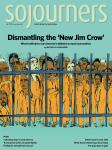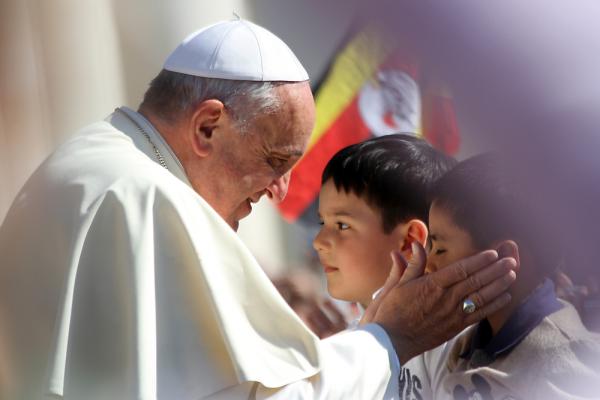SINCE HIS ELECTION as the 265th successor of St. Peter, Pope Francis has provided a refresher course on Catholic social teaching to the world’s 1.2 billion Catholics. “Catholic social teaching is no longer a secret,” says Jean Hill, director of peace and justice for the diocese of Salt Lake City. “Everything Pope Francis is saying comes from social doctrine and is about social justice.”
Through his various homilies, speeches, and meetings, Francis is “reading the signs of the times” and making practical application to the issues of the day. Some of his most powerful statements to date were made in his first pastoral document, “The Joy of the Gospel,” including this declaration: “I prefer a church which is bruised, hurting, and dirty because it has been out on the streets, rather than a church that is unhealthy from being confined and from clinging to its own security.”
Pope Francis is calling the faithful to be more merciful, compassionate, joyful, and centered upon the needs of the poor and vulnerable. He wants a church that sees the human person before the law and one that does not “obsess” about a narrow set of issues, but affirms both human life and human dignity. He invites Catholics to pray, reflect, and embrace the beauty and breadth of Catholic social teaching—a rich tradition that is predicated on the dignity of the human person.
The United States Conference of Catholic Bishops (USCCB) defines Catholic social teaching as “a central and essential element of our faith. Its roots are in the Hebrew prophets who announced God’s special love for the poor and called God’s people to a covenant of love and justice.” This teaching is also founded on the life and words of Jesus. It posits that “every human being is created in the image of God and redeemed by Jesus Christ, and therefore is invaluable and worthy of respect as a member of the human family.”
For Catholics and people of other faiths, this teaching matters because it can serve as a moral compass that provides guidance for addressing contemporary issues, such as domestic and global poverty, abortion, the death penalty, immigration, health care, human trafficking, and the environment. The moral dimensions of this teaching provide hope and inspiration to a world that has too often become cynical, disillusioned, and alienated. Finally, such teaching can function as a common ground upon which people of various faiths can come together to promote the common good of our society.
This social tradition is best summarized by seven principles or themes, as illustrated by Pope Francis’ teachings:
1. Life and Dignity of the Human Person
“A human being is always sacred and inviolable, in any situation and at every stage of development. Human beings are ends in themselves and never a means of resolving other problems. ... It is also true that we have done little to adequately accompany women in very difficult situations where abortion appears as a quick solution to their profound anguish, especially when the life developing within them is the result of rape or a situation of extreme poverty.”
2. Call to Family, Community, and Participation
“Give up the way of arms and go out to meet the other in dialogue, pardon, and reconciliation, in order to rebuild justice, trust, and hope around you!”
3. Rights and Responsibilities
“Today we also have to say ‘thou shall not’ to an economy of exclusion and inequality. Such an economy kills. How can it be that it is not a news item when an elderly homeless person dies of exposure, but it is news when the stock market loses two points?”
4. Option for the Poor and Vulnerable
“Each individual Christian and every community is called to be an instrument of God for the liberation and the promotion of the poor, and for enabling them to be fully a part of society. ... They have much to teach us.”
5. The Dignity of Work and the Rights of Workers
“Work is fundamental to the dignity of a person. Work, to use an image, ‘anoints’ us with dignity, fills us with dignity, [and] makes us similar to God, who has worked and still works, who always acts.”
6. Solidarity
“We all have a responsibility to act so that the world may be a community of brothers [and sisters] who respect each other, who accept their diversity, and who take care of one another.”
7. Care for God’s Creation
“We are losing the attitude of wonder, contemplation, listening to creation. The implications of living in a horizontal manner [are] that we have moved away from God.”
ONE PRACTICAL tool to help operationalize these principles is what is known as the pastoral cycle, developed by Joe Holland and Peter Henriot, SJ. This process incorporates four fundamental questions for parish groups, congregations, and other faith-based organizations: What is happening? Why is it happening? How shall we respond? What does it mean?
The pastoral cycle also includes the following steps:
1. Experience:
This initial stage of the cycle requires a description of the problem. What is the lived experience? Are we listening to the people most directly impacted by the issue?
2. Social Analysis:
At this stage, congregations or community organizations investigate the reality of the problem or issue. What are the political, economic, cultural, and historical roots of the issue? Social analysis also assesses the consequences of certain actions and identifies the key decision-makers who have the power to change the problem or issue.
3. Theological Reflection:
This entails reflecting on the issue in the light of the gospel and church teaching. Are gospel values being upheld? How do the scriptures and principles of Catholic social teaching speak to the issue? Can the experience of the Christian community over time aid us in discerning a response?
4. Response:
Our response draws on human knowledge and tradition. What is the proper action for our parish, congregation, nonprofit, coalition, or community organization? Does it entail advocacy and social change, the establishment of services for the poor or marginalized, further faith formation, and/or awareness-raising?
Many of the faith-based groups funded by the Catholic Campaign for Human Development (CCHD)—the USCCB’s domestic antipoverty program—use some form of this practice in their advocacy or campaigns. In 2013, CCHD gave 214 grants totaling $9 million to groups working to organize farmworkers, reform payday lending, establish credit unions, and create housing alternatives, among other things. CCHD embodies a Catholic principle known as subsidiarity—the belief that those directly impacted by unjust systems and structures have the best insight into knowing how to change them.
IN HIS SIMPLE manner, Pope Francis is having a profound impact on those doing the work of social justice education and advocacy around the nation. In my conversations with several local and national leaders, it’s clear that Francis has inspired, animated, re-energized, affirmed, and revived the challenging work they do. The consensus is that both John Paul II and Benedict XVI substantively advanced the church’s social teaching; however, Francis is reaching audiences like no one before him.
Brian Corbin has served the diocese of Youngstown, Ohio, for 27 years as director of Catholic Charities and a leader in social action. He incorporates Francis’ teaching in board and staff training, as well as in a course on peacebuilding. He also promotes the “One Human Family: Food for All Campaign,” a worldwide campaign to end hunger by 2025, as a framework for working on local, state, and national issues of food insecurity. The Food for All Campaign was initiated by Caritas Internationalis and launched by the pope in December 2013.
Corbin was successful in urging colleagues at the Catholic Conference of Ohio to join the campaign. According to Jim Tobin, associate director of the CCO, “There is an excitement about the pope. He gets his hands dirty, and we are in need of new energy.”
In the archdiocese of Kansas City, Mo., Jude Huntz, who heads the human rights office, believes that Francis is inspiring parish interest in JustFaith, a program that seeks to transform people and expand their commitment to social ministry. Huntz recently hosted Jack Jezreel, director of JustFaith, who spoke about Pope Francis, social justice, and parish renewal.
Huntz was instrumental in inviting Archbishop Francis A. Challikatt, apostolic nuncio and permanent observer of the Holy See at the United Nations, to speak to the annual roundtable conference about the “Joy of the Gospel.” The archbishop had previously visited Kansas City to assist the diocese in its opposition to the construction of a nuclear weapons plant in the region. According to Pat O’Bryan, chair of the roundtable, the speech by the archbishop was met with five standing ovations from the 600 social ministry attendees and was “an affirmation of who we are.” O’Bryan added, “Pope Francis has awakened in me the spirit and empowerment of the Second Vatican Council. All of us have the ability and right as Catholic citizens to be active doers and participants in the community.”
O’Bryan works closely with Sister Kathleen Ryan, SND, the social action director in Cleveland. Sister Ryan says her staff is revitalizing its Sowers of Justice leadership program for parishioners to better reflect the “Joy of the Gospel.” Since Francis has spoken eloquently about the problem of human trafficking, the 20 schools who have covenanted as “Catholic Schools for Peace and Justice” will focus their 2015 conference on that issue.
Mat Catto directs the office of life, justice, and peace for the archdiocese of Portland, Ore. In April, his office sponsored a parish social ministry regional conference titled “Opening a Horizon of Hope: Transformed by Christ to Love All.” The workshops included sessions on fair trade, poverty, and economic inequality. Each session was inspired by a quote from Pope Francis.
In the diocese of Little Rock, Ark., where Tom Navin serves as social action director, Catholics are only a small percentage of the overall population. Navin often works in coalition with other faith communities to enhance the influence of his office on issues such as prison ministry. He frequently hears his non-Catholic friends enthusiastically say, “Did you hear what Francis said today?”
In listening to the stories of those who toil for peace and justice, there is new energy and fresh air being breathed into Catholic social teaching. As Navin affirms, “Seeing Francis at work gives me the feeling that I am at the right place, at the right time, doing the right thing.”

Got something to say about what you're reading? We value your feedback!
